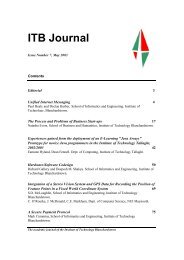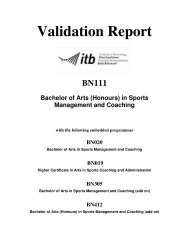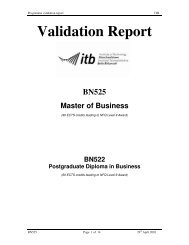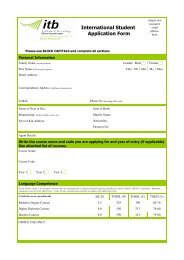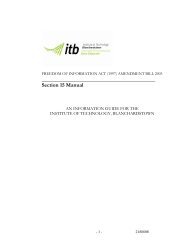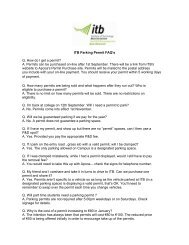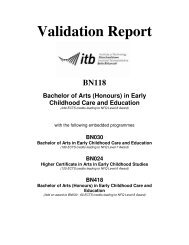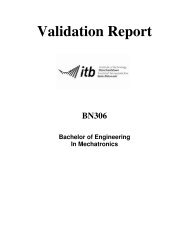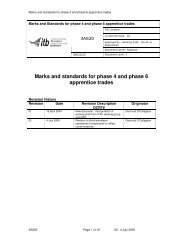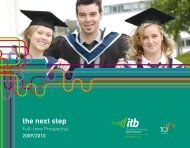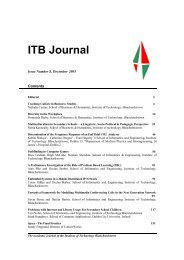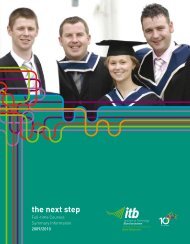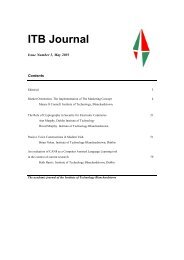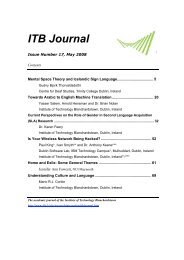Directors' Report and Financial Statements Structures and Statistics ...
Directors' Report and Financial Statements Structures and Statistics ...
Directors' Report and Financial Statements Structures and Statistics ...
You also want an ePaper? Increase the reach of your titles
YUMPU automatically turns print PDFs into web optimized ePapers that Google loves.
10 Institute of Technology Blanchardstown Annual <strong>Report</strong> 1999–2002: Volume 2<br />
11<br />
Teanga, Cultúr agus Sochaí Gaelach<br />
Tá ITB ag iarraidh go dearfa, aithne agus tuiscint ar an teanga, cultúr agus an sochaí gaelach a cruthú. Chun é<br />
sin a dhéanamh, tá na hiarrachtaí seo a leanas ar bhun sa choláiste.<br />
Tá ainm gaelach ar gach foirgneamh sa champus nua, mar seo a leanas:<br />
Bloc A<br />
Bloc B<br />
Bloc C<br />
Bloc D<br />
Bloc E<br />
Bloc F<br />
Aontas (Réamh-fhoirgneamh)<br />
Buntús (Ionad Foghlamtha)<br />
Croí (Foirgneamh Ilfheidhmeach,<br />
an halla spóirt agus an bialann san áireamh)<br />
Doras (Foirgneamh na bPrintíseach)<br />
Eolas (Foirgneamh Múinteoireachta)<br />
Fios (Foirgneamh Leabharlainne agus Riaracháin)<br />
Tá comharthaí dátheangacha i ngach foirgneamh<br />
Bunaíodh cumann agallaimh gaelaigh chun an teanga labharta a spreagadh idir an foireann agus na mic léinn<br />
agus bíonn cruinniú acu go rialta.<br />
Tá modúl nua, darbh ainm Cultúr agus Sochaí Gaelach, sa chéad téarma den chúrsa Teastas Náisiúnta sa<br />
Staidéir Ghnó. Agus an modúl seo críochnaithe acu, tuighfidh na mic léinn conas mar a fhorbair an sochaí<br />
agus an cultúr gaelach go dtí an lá atá inniu ann agus na cumhachtaí is mó a ndeachaigh i gcion ar an gcultúr.<br />
Irish Language, Culture <strong>and</strong> Society<br />
ITB proactively wants to create an awareness <strong>and</strong> underst<strong>and</strong>ing of Irish language, culture <strong>and</strong> society. The<br />
following initiatives have been undertaken to this end:<br />
All buildings on our new campus have Irish names, as follows:<br />
Block A<br />
Block B<br />
Block C<br />
Block D<br />
Block E<br />
Block F<br />
Aontas (Advance Building)<br />
Buntús (Learning <strong>and</strong> Innovation Building)<br />
Croí (Multipurpose Building including Sports Hall <strong>and</strong> Restaurant)<br />
Doras (Apprentice Building)<br />
Eolas (Teaching Building)<br />
Fios (Library <strong>and</strong> Administration Building)<br />
All signage within these buildings are bi-lingual.<br />
To encourage the use of conversational Irish among staff <strong>and</strong> students, an Irish conversation group has been<br />
established <strong>and</strong> holds regular meetings.<br />
A module called Irish Culture <strong>and</strong> Society has been introduced into the first semester of the National<br />
Certificate in Business Studies Course. On completion of this module students have an underst<strong>and</strong>ing of how<br />
Irish society <strong>and</strong> culture has developed to date <strong>and</strong> the major influences in the development of Irish culture.<br />
Academic <strong>and</strong> Student Affairs<br />
Academic Council<br />
The first Academic Council was appointed in February 2000. Council members are appointed for a period of<br />
three years (with the exception of student representatives) <strong>and</strong> are eligible for reappointment. The Academic<br />
Council currently has 17 members. The Council normally meets five times per year on a scheduled basis, with<br />
additional meetings as necessary.<br />
The Council has established a number of sub-committees. These subcommittees meet normally once per<br />
semester during the academic year, or more frequently if required.<br />
The main focus of each sub-committee is:<br />
Admissions: responsible for policy <strong>and</strong> development of admissions <strong>and</strong> recommendation of regulations to the<br />
Governing Body for the selection, retention <strong>and</strong> exclusion of students.<br />
Research <strong>and</strong> Postgraduate Studies: responsible for assisting the Governing Body in the planning, coordination,<br />
quality control <strong>and</strong> development of postgraduate studies within the Institute.<br />
Apprenticeship Sub-committee: responsible for academic operations <strong>and</strong> quality st<strong>and</strong>ards of phase 4 & 6 of<br />
FAS Apprenticeship offered.<br />
Education Subcommittee: considers practices <strong>and</strong> new innovative procedures applied to teaching<br />
academic courses.<br />
The Academic Council appoints a Course Board for each academic course annually, <strong>and</strong> also appoints extern<br />
examiners for all courses. Both these activities are part of the ongoing academic quality assurance<br />
programme of ITB.<br />
The Academic Council members are:<br />
Mary Meaney<br />
Director<br />
Diarmuid O’Callaghan Registrar (September 2000)<br />
Larry McNutt<br />
Head of School<br />
Pat McGarty Head of School (ceased March 2002)<br />
Brian Watters Academic <strong>and</strong> Acting Head of School (March 2002)<br />
Aidín O’Sullivan<br />
Librarian<br />
Gary Bernie<br />
Academic<br />
Richard Gallery<br />
Academic<br />
Geraldine Gray<br />
Academic<br />
Anthony Keane<br />
Academic<br />
Mary Ann Kenny<br />
Academic<br />
Raymond Manley<br />
Academic<br />
Brian Nolan<br />
Academic<br />
Terence Sheridan<br />
Academic<br />
Stephen White<br />
Technical Support<br />
Martin Cummins<br />
Student Representative<br />
Irene Murtagh<br />
Student Representative



